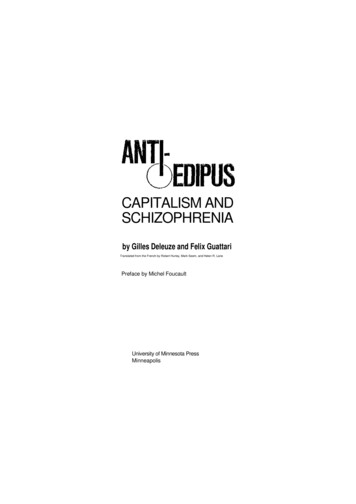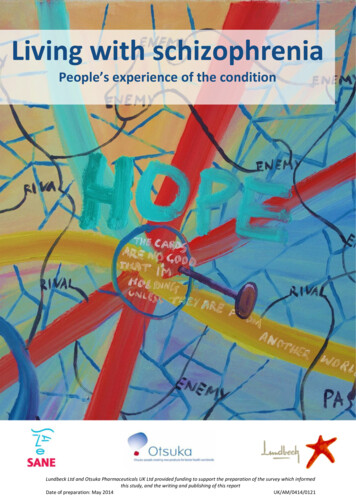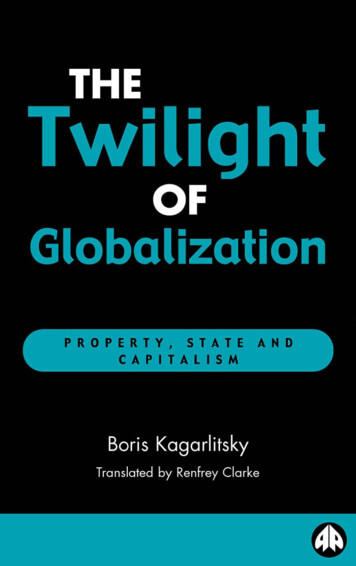
Transcription
CAPITALISM ANDSCHIZOPHRENIAby Gilles Deleuze and Felix GuattariTranslated from the French by Robert Hurley, Mark Seem, and Helen R. LanePreface by Michel FoucaultUniversity of Minnesota PressMinneapolis
Copyright 1983 by the University of MinnesotaAll rights reserved.Published by the University of Minnesota Press111 Third Avenue South, Suite 290, Minneapolis, MN 55401-2520http://www.upress.umn.eduPrinted in the United States of America on acid-free paperTenth printing 2000Originally published asL'Anti-Oedipe 1972 by Les Editions de MinuitEnglish language translation Copyright Viking Penguin, 1977Reprinted by arrangement with Viking Penquin, a division of PenquinBooks USA Inc.Library of Congress Cataloging in Publication DataDeleuze, Gilles.Anti-Oedipus.Translation of: L'anti-Oedipe.Reprint. Originally published: New York: Viking Press, 1977.Includes bibliographical references and index.1. Social psychiatry. 2. Psychoanalysis—Social aspects. 3. Oedipuscomplex—Social aspects. 4. Capitalism. 5. Schizophrenia—Social aspects. I.Guattari, Felix.II. Title.RC455.D422131983I50.19'5283-14748ISBN 0-8166-1225-0 (pbk.)ACKNOWLEDGMENTSCalder and Boyars Ltd.: From Collected Works, Antonin Artaud.City Lights: From "(Caddish" from Kaddish & Other Poems by Allen Ginsberg.Copyright 1961 by Allen Ginsberg. From Artaud Anthology by Antonin Artaud.Copyright 1956, 1961, 1965 by Editions Gallimard and City Lights Books.Reprinted by permission of City Lights Books.Humanities Press Inc. and Athlone Press: From Rethinking Anthropology by E. R.Leach.Mercure de France: From Nietzsche ou le Cercle Vicieux by Pierre Klossowski.Pantheon Books, a Division of Random House, Inc.: From Madness and Civilizationby Michel Foucauit, translated by Richard Howard. Copyright 1965 by RandomHouse, Inc.Presses Universitaires de France: From L Affect by Andre Green.
CONTENTSPREFACEby Michel FoucaultINTRODUCTIONby Mark SeemxixvTHE DESIRING-MACHINES1. Desiring-ProductionIThe schizo's stroll Nature and industry The process Desiring-machine, partial objects and flows: and . . . and .» The firstsynthesis: the connective synthesis or production of production Theproduction of the body without organs 2. The Body without Organs9Anti-production Repulsion and the paranoiac machine Desiring-production and social production: how anti-productionappropriates the productive forces Appropriation or attraction, and themiraculating-machine—The second synthesis: the disjunctive synthesis orproduction of recording Either . . . or . . . The schizophrenicgenealogy
3. The Subject and Enjoyment16The celibate machine The third synthesis- the conjunctive synthesis orproduction of consumption-consummation So it's .» Matter, egg, andintensities: I feel The names in history 4. A Materialist Psychiatry22The unconscious and the category of production Theater or factory? The process as production process The idealist conception ofdesire as lack (fantasy) The real and. desiring-production: the passivesyntheses One and the same production, social and desiring Thereality of the group fantasy o The differences in regime betweendesiring-production and social production The socius and the bodywithout organs Capitalism, and schizophrenia as its limit (the counteracted tendency) Neurosis, psychosis, and perversion 5. The Machines36Desiring-machines are machines, no metaphor The first mode of break:flows and selection from flows The second mode: chains or codes, anddetachments from them The third mode: subject and residue 6. The Whole and Its Parts42The status of multiplicities The partial objects The critique ofOedipus, the Oedipal mystification Already the child . Theorphan-conscious What is wrong with psychoanalysis? PSYCHOANALYSIS AND FAMILIALISM:THE HOLY FAMILY1. The Imperialism of Oedipus51Its modes The Oedipal turning-point in psychoanalysis Desiring-production and representation The abandonment of thedesiring-machines »2. Three Texts of FreudOedipalization The flattening-out of Judge Schreber'sdelirium How psychoanalysis is still pious The ideology of lack: castration Every fantasy is collective The libido as flow The rebellionof the flows 563. The Connective Synthesis of Production68Its two uses, global and specific, partial and non-specific The familyand the couple, filiation and alliance: triangulation The triangulation'scause The first paralogism of psychoanalysis: extrapolation Thetranscendent use and the immanent use 4. The Disjunctive Synthesis of Recording75Its two uses, exclusive and restrictive, inclusive, and nonrestric-tive Theinclusive disjunctions: genealogy The exclusive differen-
tiations and the nondifferentiated The second paralogism of psychoanalysis: the Oedipal double-bind Oedipus wins at every turn Does theborderline pass between the Symbolic and the Imaginary?5. The Conjunctive Synthesis of Consumption-Consummation84Its two uses, segregative and biunivocal, nomadic and polyvocal Thebody without organs and intensities Voyages, passages: I am becoming Every delirium is social, historical, and political Races The meaningof identification How psychoanalysis suppresses sociopolitical content An unrepentant familialism The family and the social field Desiring-production and the investment of social production Fromchildhood The third paralogism of psychoanalysis: Oedipus as abiunivocal "application" The disgrace of psychoanalysis with regard tohistory Desire and the infrastructure Segregation and nomadism 6. A Recapitulation of the Three Syntheses106Oedipus would make fools of us all Oedipus and "belief" Meaning isuse The immanent criteria of desiring-production Desire knowsnothing of the law, lack, and the signifier "Were you born Hamlet . . . ? 7. Social Repression and Psychic Repression113The law The fourth paralogism of psychoanalysis: the displacement, orthe disfiguration of the repressed Desire is revolutionary Thedelegated agent, of psychic repression It is not psychoanalysis thatinvents Oedipus 8. Neurosis and Psychosis122Reality The inverse relation "Undecidable" Oedipus: resonance Themeaning of actual factors The fifth paralogism of psychoanalysis: theafterward The actuality of desiring-production 9. The Process130Leaving The painter Turner The interruptions of the process: neurosis,psychosis, and perversion The movement of deterritoriali-zation andterritorialities SAVAGES, BARBARIANS, CIVILIZED MEN1. The Inscribing Socius139The recording process In what sense capitalism is universal The socialmachine The problem of the socius, coding the flows Not exchanging,but marking and being marked The investment and the disinvestment oforgans Cruelty: creating a memory for man 2. The Primitive Territorial Machine145The full body of the earth Filiation and alliance: their irreducibility The village pervert and local groups Filiative stock and blocks of
alliance debt Functional disequilibrium: surplus value of code It onlyworks by breaking down The segmentary machine The great fear ofdecoded flows Death which rises from within, but comes from without 3. The Problem of Oedipus154Incest The inclusive disjunctions on the full body of the earth Fromintensities to extension: the sign In what sense incest is impossible The limit The conditions of coding The in-depth elements ofrepresentation: the repressed representative, the repressing representation,the displaced represented 4. Psychoanalysis and Ethnology166Continuation of the Oedipal problem A process of treatment in Africa The conditions of Oedipus and colonization Oedipus and ethnocide Those who oedipalize don't know what they're doing On what is psychicrepression brought to bear? Culturalists and univer-salists: theircommon postulates In what sense Oedipus is indeed universal: the fivemeanings of limit, Oedipus as one of them Use, or functionalism inethnology The desiring-machines do not mean anything Molar andmolecular 5. Territorial Representation184Its surface elements Debts and exchange The five postulates of theexchangist conception Voice, graphism, and eye: the theater of cruelty Nietzsche The death of the territorial system 6. The Barbarian Despotic Machine192The full body of the despot New alliance and direct filiation Theparanoiac Asiatic production The bricks The mystifications of theState Despotic deterritorialization and the infinite debt » Over-codingthe flows 7. Barbarian or Imperial Representation200Its elements Incest and overcoding The in-depth elements and themigration of Oedipus: incest becomes possible The surface elements,the new voice-graphism relationship The transcendent object from onhigh The signifier as the deterritorialized sign The despotic signifi-er,and the signifieds of incest Terror, the law The form of the infinitedebt: latency, vengeance, and ressentiment This is still not Oedipus .»8. The Urstaat217A single State? The State as a category Beginning and origin Theevolution of the State:becoming-concrete and becoming-immanent 9. The Civilized Capitalist Machine222The full body of money-capital * Decoding and the conjunction ofdecodedflows Cynicism Filiativecapital and alliancecapi-
tal The transformation of surplus value of code into a surplus value offlux The two forms of money, the two inscriptions The fallingtendency Capitalism and deterritorialization Human surplus value andmachinic surplus value Anti-production The various aspects of thecapitalist immanence The flows 10. Capitalist Representation240Its elements The figures or schizzes-flows The two meanings of theschiz-flow: capitalism and schizophrenia The difference between a codeand an axiomatic The capitalist State, its relationship with the Urstaat The class Class bipolarity Desire and interest Capitalistdeterritorialization and re-territorializations: their relationship, and thelaw of the falling tendency The two poles of the axiomatic: the despoticsignifier and the schizophrenic figure, paranoia and schizophrenia Arecapitulation of the three great social machines: the territorial, thedespotic, and the capitalist (coding, overcoding, decoding) 11. Oedipus at Last262Application Social reproduction and human reproduction The twoorders of images Oedipus and its limits Oedipus and the recapitulationof the three states The despotic symbol and capitalist images Badconscience Adam Smith and Freud 4INTRODUCTION TO SCHIZOANALYSIS1. The Social Field273Father and child Oedipus, a father's idea The unconscious as a cycle The primacy of the social investment: its two poles, paranoia andschizophrenia Molar and molecular 2. The Molecular Unconscious283Desire and machine Beyond vitalism and mechanism The two states ofthe machine Molecular functionalism The syntheses The libido, thelarge aggregates and the micro-multiplicities The gigantism and thedwarfism of desire The nonhuman sex: not one, not two, but n sexes.3. Psychoanalysis and Capitalism296Representation Representation and production Against myth andtragedy The ambiguous attitude of psychoanalysis with regard to mythand tragedy In what sense psychoanalysis fractures representation, inwhat sense it restores representation The requirements of capitalism Mythic, tragic, and psychoanalytic representation The theater Subjective representation and structural representation Structuralism,familialism, and the cult of lack The destructive task of schizoanalysis,cleansing the unconscious: a malevolent activity Deterritorialization andre-territorialization: their relationship, and dreams The machinic indices Politicization: social alienation and mental alienation Artifice andprocess, old earths and the new earth
4. The First Positive Task of Schizoanalysis322Desiring-production and its machines The status of partial objects Thepassive syntheses The status of the body without organs Thesignifying chain and codes The body without organs, death, and desire Schizophrenizing death The strange death cult in psychoanalysis: thepseudo-instinct The problem of affinities between the molar and themolecular The mechanic's task of schizoanalysis 5. The Second Positive Task340Social production and its machines The theory of the twopoles The first thesis: every investment is molar and social Gregariousness, selection, and the form of gregariousness The second thesis:distinguish in social investments the preconscious investment of class orinterest, from the unconscious libidinal investment of desire orgroup The nature of this libidinal investment of the social field Thetwo groups The role of sexuality, the "sexual revolution" The thirdthesis: the libidinal investment of the social field is primary in relation tothe familial investments The theory of "maids" in Freud, Oedipus anduniversal familialism The poverty of psychoanalysis: 4, 3, 2, 1,0 Even antipsychiatry .» What is the schizophrenic sickfrom? The fourth thesis: the two poles of the libidinal social investment Art and science The task of schizoanalysis in relation to therevolutionary movements.REFERENCE NOTES383INDEX397
PREFACEby Michel FoucaultDuring the years 1945-1965 (I am referring to Europe),there was a certain way of thinking correctly, a certain style of politicaldiscourse, a certain ethics of the intellectual. One had to be on familiarterms with Marx, not let one's dreams stray too far from Freud. And onehad to treat sign-systems—the signifier—with the greatest respect.These were the three requirements that made the strange occupation ofwriting and speaking a measure of truth about oneself and one's timeacceptable.Then came the five brief, impassioned, jubilant, enigmatic years. Atthe gates of our world, there was Vietnam, of course, and the first majorblow to the powers that be. But here, inside our walls, what exactly wastaking place? An amalgam of revolutionary and antirepressive politics?A war fought on two fronts: against social exploitation and psychicrepression? A surge of libido modulated by the class struggle? Perhaps.At any rate, it is this familiar, dualistic interpretation that has laid claimxl
to the events of those years. The dream that cast its spell, between theFirst World War and fascism, over the dreamiest parts of Europe—theGermany of Wilhelm Reich, and the France of the surrealists—hadreturned and set fire to reality itself: Marx and Freud in the sameincandescent light.But is that really what happened? Had the Utopian project of thethirties been resumed, this time on the scale of historical practice? Orwas there, on the contrary, a movement toward political struggles thatno longer conformed to the model that Marxist tradition had prescribed?Toward an experience and a technology of desire that were no longerFreudian. It is true that the old banners were raised, but the combatshifted and spread into new zones.Anti-Oedipus shows first of all how much ground has been covered.But it does much more than that. It wastes no time in discrediting the oldidols, even though it does have a great deal of fun with Freud. Mostimportant, it motivates us to go further.It would be a mistake to read Anti-Oedipus as the new theoreticalreference (you know, that much-heralded theory that finally encompasseseverything, that finally totalizes and reassures, the one we are told we"need so badly" in our age of dispersion and specialization where "hope"is lacking). One must not look for a "philosophy" amid the extraordinaryprofusion of new notions and surprise concepts: Anti-Oedipus is not aflashy Hegel. I think that Anti-Oedipus can best be read as an "art," in thesense that is conveyed by the term "erotic art," for example. Informed bythe seemingly abstract notions of multiplicities, flows, arrangements, andconnections, the analysis of the relationship of desire to reality and to thecapitalist "machine" yields answers to concrete questions. Questions thatare less concerned with why this or that than with how to proceed. Howdoes one introduce desire into thought, into discourse, into action? Howcan and must desire deploy its forces within the political domain andgrow more intense in the process of overturning the established order?Ars erotica, ars theoretica, ars politico.Whence the three adversaries confronted by Anti-Oedipus. Threeadversaries who do not have the same strength, who represent varyingdegrees of danger, and whom the book combats in different ways:1. The political ascetics, the sad militants, the terrorists of theory,those who would preserve the pure order of politics and politicaldiscourse. Bureaucrats of the revolution and civil servants of Truth.2. The poor technicians of desire—psychoanalysts and semiolo-xliPREFACE
gists of every sign and symptom—who would subjugate the multiplicityof desire to the twofold law of structure and lack.3. Last but not least, the major enemy, the strategic adversary isfascism (whereas Anti-Oedipus' opposition to the others is more of atactical engagement). And not only historical fascism, the fascism ofHitler and Mussolini—which was able to mobilize and use the desire ofthe masses so effectively—but also the fascism in us all, in our heads andin our everyday behavior, the fascism that causes us to love power, todesire the very thing that dominates and exploits us.I would say that Anti-Oedipus (may its authors forgive me) is a bookof ethics, the first book of ethics to be written in France in quite a longtime (perhaps that explains why its success was not limited to aparticular "readership": being anti-oedipal has become a life style, a wayof thinking and living). How does one keep from being fascist, even(especially) when one believes oneself to be a revolutionary militant?How do we rid our speech and our acts, our hearts and our pleasures, offascism? How do we ferret out the fascism that is ingrained in ourbehavior? The Christian moralists sought out the traces of the fleshlodged deep within the soul. Deleuze and Guattari, for their part, pursuethe slightest traces of fascism in the body.Paying a modest tribute to Saint Francis de Sales,* one might saythat Anti-Oedipus is an Introduction to the Non-Fascist Life.This art of living counter to all forms of fascism, whether alreadypresent or impending, carries with it a certain number of essentialprinciples which I would summarize as follows if I were to make thisgreat book into a manual or guide to everyday life: Free political action from all unitary and totalizing paranoia. Develop action, thought, and desires by proliferation, juxtaposition, and disjunction, and not by subdivision and pyramidalhierarchiza-tion. Withdraw allegiance from the old categories of the Negative (law,limit, castration, lack, lacuna), which Western thought has so long heldsacred as a form of power and an access to reality. Prefer what ispositive and multiple, difference over uniformity, flows over unities,mobile arrangements over systems. Believe that what is productive isnot sedentary but nomadic. Do not think that one has to be sad in order to be militant, eventhough the thing one is fighting is abominable. It is the connection of*A seventeenth-century priest and Bishop of Geneva, known for his Introduction to the Devout Life.PREFACExiil
desire to reality (and not its retreat into the forms of representation) thatpossesses revolutionary force. Do not use thought to ground a political practice in Truth; norpolitical action to discredit, as mere speculation, a line of thought. Usepolitical practice as an intensifier of thought, and analysis as a multiplierof the forms and domains for the intervention of political action. Do not demand of politics that it restore the "rights" of theindividual, as philosophy has defined them. The individual is the productof power. What is needed is to "de-individualize" by means of multiplication and displacement, diverse combinations. The group must not bethe organic bond uniting hierarchized individuals, but a constant generator of de-individualization. Do not become enamored of power.It could even be said that Deleuze and Guattari care so little forpower that they have tried to neutralize the effects of power linked totheir own discourse. Hence the games and snares scattered throughoutthe book, rendering its translation a feat of real prowess. But these arenot the familiar traps of rhetoric; the latter work to sway the readerwithout his being aware of the manipulation, and ultimately win himover against his will. The traps of Anti-Oedipus ate those of humor: somany invitations to let oneself be put out, to take one's leave of the textand slam the door shut. The book often leads one to believe it is all funand games, when something essential is taking place, something ofextreme seriousness: the tracking down of all varieties of fascism,fromthe enormous ones that surround and crush us to the petty ones thatconstitute the tyrannical bitterness of our everyday lives.KitfPREFACE
INTRODUCTIONby Mark Seem"We must die as egos and be bornagain in the swarm, not separateand self-hypnotized, but individualand related."—Henry Miller, SexusThe Anti-Ego"Lie down, then, on the soft couch which the analystprovides, and try to think up something different. The analyst hasendless time and patience; every minute you detain him means money inhis pocket. . . . Whether you whine, howl, beg, weep, cajole, pray orcurse—he listens. He is just a big ear minus a sympathetic nervoussystem. He is impervious to everything but truth. If you think it pays tofool him then fool him. Who will be the loser? If you think he can helpyou, and not yourself, then stick to him until you rot."1* So concludesHenry Miller in Sexus, and Gilles Deleuze and Felix Guattari are quickto agree in their attack on psychoanalysis' own Oedipus complex (theholy family: daddy-mommy-me), an attack that is at times brutal andwithout pity, at other times sympathetic and full of a profound love of Reference notes begin on page 383.
life, and often enormously amusing. An attack on the ego, on what isall-too-human in mankind, on oedipalized and oedipalizing analyses andneurotic modes of living.In confronting and finally overturning the Oedipal rock on whichMan has chosen to take his stand, Anti-Oedipus comes as a kind ofsequel to another similar venture, the attack on Christ, Christianity, andthe herd in Nietzsche's The Antic hrist. For who would deny,Anti-Oedipus begins, that psychoanalysis was from the start, still is, andperhaps always will be a well-constituted church and a form oftreatment based on a set of beliefs that only the very faithful couldadhere to, ie., those who believe in a security that amounts to being lostin the herd and defined in terms of common and external goals? Butwhere do such beliefs originate? What are they based on? For it isabsolutely hopeless to think in terms of security, as Miller states inSexus; "there is none. The man who looks for security, even in the mind,is like a man who would chop off his limbs in order to have artificial oneswhich will give him no pain or trouble" (page 428). No pain, notrouble—this is the neurotic's dream of a tranquilized and conflict-freeexistence.Such a set of beliefs, Deleuze and Guattari demonstrate, such aherd instinct, is based on the desire to be led, the desire to have someoneelse legislate life. The very desire that was brought so glaringly intofocus in Europe with Hitler, Mussolini, and fascism; the desire that isstill at work, making us all sick, today. Anti-Oedipus starts by revivingReich's completely serious question with respect to the rise of fascism:'How could the masses be made to desire their own repression?' This isa question which the English and Americans are reluctant to deal withdirectly, tending too often to respond: "Fascism is a phenomenon thattook place elsewhere, something that could only happen to others, butnot to us; it's their problem." Is it though? Is fascism really a problemfor others to deal with? Even revolutionary groups deal gingerly with thefascisizing elements we all carry deep within us, and yet they oftenpossess a rarely analyzed but overriding group 'superego' that leadsthem to state, much like Nietzsche's man of ressentiment, that the otheris evil (the Fascist! the Capitalist! the Communist!), and hence that theythemselves are good. This conclusion is reached as an afterthought and ajustification, a supremely se//-righteous rationalization for a politics thatcan only "squint" at life, through the thick clouds of foul-smelling airthat permeates secret meeting places and "security" councils. The manof ressentiment, as Nietzsche explains, "loves hiding places, secret pathsand back doors, everything covert entices him as his world, his security,his refreshment; he understands how to keep silent, how not to forget,mlINTRODUCTION
how to wait, how to be provisionally self-deprecating and humble."2Such a man, Nietzsche concludes, needs very much to believe in someneutral, independent "subject"—the ego—for he is prompted by aninstinct of self-affirmation and Jeff-preservation that cares little aboutpreserving or affirming life, an instinct "in which every lie is sanctified."3 This is the realm of the silent majority. And it is into these backrooms, behind the closed doors of the analyst's office, in the wings of theOedipal theater, that Deleuze and Guattari weave their way, exclaimingas does Nietzsche that it smells bad there, and that what is needed is "abreath of fresh air, a relationship with the outside world."In examining the problem of the subject, the behind-the-scenesreactive and reactionary man, Anti-Oedipus develops an approach that isdecidedly diagnostic ("What constitutes our sickness today?") andprofoundly healing as well. What it attempts to cure us of is the cureitself. Deleuze and Guattari term their approach "schizoanalysis," whichthey oppose on every count to psychoanalysis. Where the lattermeasures everything against neurosis and castration, schizoanalysisbegins with the schizo, his breakdowns and his breakthroughs. For, theyaffirm, "a schizophrenic out for a walk is a better model than a neuroticlying on the analyst's couch. . . ." Against the Oedipal and oedipalizedterritorialities (Family, Church, School, Nation, Party), and especiallythe territoriality of the individual, Anti-Oedipus seeks to discover the"deterritorialized" flows of desire, the flows that have not been reducedto the Oedipal codes and the neuroticized territorialities, thedesiring-machines that escape such codes as lines of escap e leadingelsewhere.Much like R.D.Laing, Deleuze and Guattari aim to develop amaterialistically and experientially based analysis of the "breakdowns"and the "breakthroughs" that characterize some of those labeledschizophrenic by psychiatry. Rather than view the creations and productions of desire—all of desiring-production—from the point of viewof the norm and the normal, they force their analysis into the sphere ofextremes. From paranoia to schizophrenia, from fascism to revolution,from breakdowns to breakthroughs, what is investigated is the processof life flows as they oscillate from one extreme to the other, on a scale ofintensity that goes from 0 ("I never asked to be born . . . leave me inpeace"), the body without organs, to the nth power ("I am all that exists,all the names in history"), the schizophrenic process of desire.The Experience of DeliriumIn order to carry out this ambitious undertaking,Anti-Oedipus makes joyously unorthodox use of many writers andthinkers,INTRODUCTIONxvll
whose concepts flow together with all the other elements in the book inwhat might well be described as a carefully constructed and executedexperiment in delirium.While Deleuze and Guattari quote frequently from Marx and Freud,it would be an error to view Anti-Oedipus as yet another attempt at aFreud/Marx synthesis. For such an attempt always treats politicaleconomy (the flows of capital and interest) and the economy of thelibido (the flows of desire) as two separate economies, even in the workof Reich, who went as far as possible in this direction. Deleuze andGuattari, on the other hand, postulate one and the same economy, theeconomy of flows. The flows and productions of desire will simply beviewed as the unconscious of the social productions. Behind everyinvestment of time and interest and capital, an investment of desire, andvice versa.In order to reach this conclusion a new confrontation was required.Not the standard confrontation between a bourgeois Freud and arevolutionary Marx, where Freud ends up the loser, but a more radicalconfrontation, between Marx the revolutionary and Nietzsche themadman. The result of this confrontation, as the authors demonstrateconvincingly, is that Freud and psychoanalysis (and perhaps evenLacan, although they remain ambiguous on this point) become "impossible.""Why Marx and Nietzsche? Now that's really mixing things up!"one might protest at this point. But there is really no cause for alarm.Readers of Marx will be happy to learn that Marx fares quite well in thisconfrontation. One might even say he is trimmed down to bare essentialsand improved upon from the point of view of use. Given Deleuze andGuattari's perspective, this confrontation was inevitable. If one wants todo an analysis of the flows of money and capital that circulate in society,nothing is more useful than Marx and the Marxist theory of money. Butif one wishes also to analyze the flows of desire, the fears and theanxieties, the loves and the despairs that traverse the social field asintensive notes from the underground (i.e., libidinal economy), one mustlook elsewhere. Since psychoanalysis is of no help, reducing as it
dwarfism of desire The nonhuman sex: not one, not two, but n sexes. 3. Psychoanalysis and Capitalism 296 Representation Representation and production Against myth and tragedy The ambiguous attitude of psychoanalysis with regard to myth and tragedy










